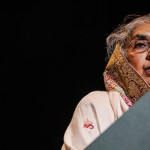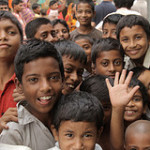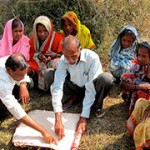Muhammad Abdul Mannan, Minister of Finance and Ministry of Planning spoke on the collaborations between IFPRI and the government of Bangladesh since the 1990s that helped the country be self-reliant, self-sufficient, and become a modern society.
Bangladesh
Despite improvements in agricultural production and improved child nutrition rates, Bangladesh continues to face persistent and emerging challenges such as worsening soil fertility, population growth, climate change, poverty, and access to natural resources. In the Government’s efforts to overcome these challenges, it has been working with IFPRI since the 1990s to develop evidence-based research on food aid, agricultural technology, gender dynamics in extension programs, nutritional interventions, and poverty reduction investments to inform policymakers.
In 2010, IFPRI, with the Government of Bangladesh Ministry of Agriculture and the United States Agency for International Development, initiated the Bangladesh Policy Research and Strategy Support Program—an innovative initiative designed to improve agriculture, and food and nutrition security that has led to research influencing the Government to adopted policies emphasizing strong food and nutrition security.
More on IFPRI’s impactful partnership with the Government of Bangladesh can be found in this brochure.
Agricultural Research that Fits Bangladesh
Matia Chowdhury, Minister of Agriculture, People’s Republic of Bangladesh, spoke on the partnership between IFPRI and the government of Bangladesh in reducing hunger.
Marketing of Multiple Micronutrient Powders in Bangladesh
MOTIVATION Micronutrient malnutrition—or, “hidden hunger”—is a chronic lack of vitamins and minerals that can lead to severe physical and mental health problems, especially when it afflicts children who are still growing. Dietary supplements called multiple micronutrient powders can add valuable nutrients to food and potentially prevent iron-deficiency anemia in infants and young children. But, even >> Read more
Food for Education in Bangladesh
MOTIVATION In 1991 IFPRI conducted a comprehensive study of a targeted food subsidy program in Bangladesh known as palli (rural) rationing. The Institute found that subsidies equivalent to US$60 million were being provided each year to run the program but about 70 percent of the subsidized food (mostly rice) was not actually making its way >> Read more
Establishing a Framework for Food Security in Bangladesh
MOTIVATION In 2001, IFPRI helped prepare a comprehensive report on national food security. This framework examined the “food gap”—that is, the difference between the country’s total food grain requirement (based on normative consumption rates for the entire population) and the total domestic production of food grains—food aid requirements, and the overall availability and accessibility of >> Read more
The South Asia Initiative: Developing Pro-Poor Policies
Motivation In the early 2000s, the Asian Development Bank (ADB) and USAID supported IFPRI’s implementation of the South Asia Initiative, aimed at addressing the region’s persistent problems of poverty and hunger using policy research, capacity strengthening, and policy dialogues. As one part of the initiative, IFPRI created the Policy Analysis and Advisory Network for South >> Read more
- « Previous Page
- 1
- …
- 3
- 4
- 5



